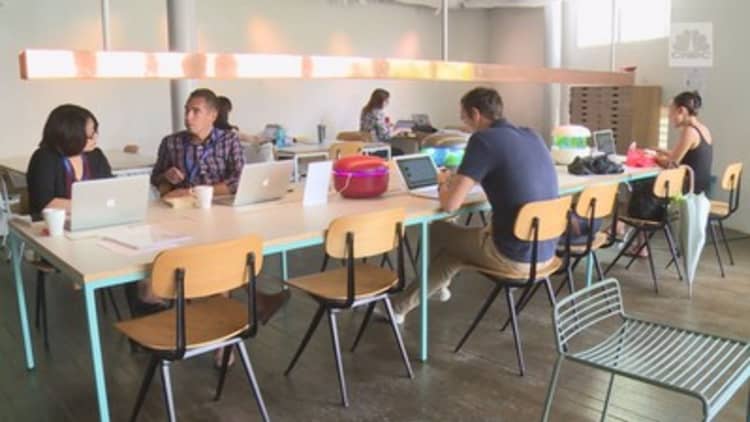If the relentless cold of British winter isn't for you, head to the balmy beaches of Thailand or Indonesia. At least that's what Jack Bennet thinks could be a lucrative alternative.
Bennet, a 24-year-old British national, temporarily left the United Kingdom during its colder months and instead hit the tropical beaches of Bali in Indonesia. Trading his coat for swim trunks, Bennet built his e-commerce businesses from a laptop in coworking spaces in Bali, as well as in Chiang Mai, Thailand. He said he spent three months in each of those locations.
"I had always been curious about the nomadic lifestyle and this was my opportunity to try it out," he said of his experience as a so-called "digital nomad" — a term used to describe mostly 20-somethings who work remotely and consider themselves to be location-independent.
He started several e-commerce businesses, one of which manufactures and sells fun-themed sandals globally. His companies, while registered in the U.K., can be operated from anywhere in the world. Despite his travels, however, he said he still pays taxes like other residents in the U.K. do.
Bennet said he's saved $4,483 by swapping continents for six months.
He found long-term accommodation through online hospitality service site Airbnb,and rented motorbikes to ride for his commute. He usually ate at inexpensive local restaurants, where in Chiang Mai, for instance, it's not uncommon to find a local dish of Pad Thai for $2.
Here's a breakdown of Bennet's costs:
Bennet's calculated costs omit miscellaneous expenses in each location, such as tickets to events and occasional massages.
His total flight costs added up to $1,010 which included routes from London to Chiang Mai, Chiang Mai to Bali, and Bali to London.
In total, Bennet calculated his typical living expense in London as $10,356 for six months. That's compared to his actual costs of $5,873 for six months in Southeast Asia, which means he saved $4,483.
"Posting pictures from spectacular tropical locations in the peak of the British winter probably hasn't made me the most popular person on social media," he said, tongue-in-cheek.
Yet, he thinks his lifestyle might inspire others to do the same.
"The concept of effectively running a business from the other side of the world is very foreign to many of my friends and family back home," he said. "I've had many friends get in touch to learn about what I'm up to and lots are keen to see how they can make this lifestyle work for them."

Meanwhile, joining coworking spaces helped Bennet do his work with reliable internet, while also meeting other remote workers in the e-commerce space. That really helped him manage his own challenges.
Coworking can be defined as individuals who work for different employers or are self-employed, sharing the same office space or working environment.
Bennet — who regularly attended workshops and skill-sharing sessions, hosted mainly by coworking spaces — is part of a generation of working adults rethinking the future of their jobs.
A report last year by U.S. market research firm Gallup found that the number of American employees working remotely at least sometimes, rose to 43 percent.
Meanwhile, coworking company WeWork, has grown to more than 600 locations worldwide in less than ten years since it was founded.
Don't miss: This 19-year-old is paying her way through college by naming over 677,000 Chinese babies
Like this story? Subscribe to CNBC Make It on YouTube!

Correction: This article has been updated to clarify that Jack Bennet visited the tropical locales of Chiang Mai in Thailand and Bali in Indonesia.


